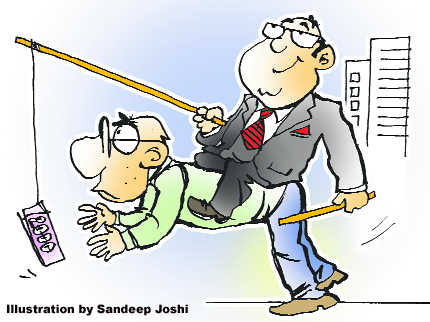
Sameer Sabharwal
The recent "demonetisation" of high-value notes has evoked reactions from a number of economists across the world. Among those who have concluded that this exercise is unlikely to succeed in meeting its stated objectives (the end of "black money"), some have suggested that we need to question why so many Indians choose not to pay their taxes, in the first place. Fair question, I thought, as I wobbled along in my car on Delhi's pitted roads. That's when it struck me.
You see, economists love to talk about equilibria. Everything must be in equilibrium and any change in economic variables leads to the economy finding a new equilibrium. So, clearly, here in India too we had an equilibrium, a compact between the citizens and the government: that we shan't pay our taxes and you (the government) need not build proper roads, or provide clean and reliable water supply, electricity, education or for that matter any form of public services.
Now this worked reasonably well for many citizens. While it was certainly not the best form of governance but, for us Indians, it meant we knew what to expect — and what not to. There was some certainty around government systems — we knew they wouldn't work and that the best solution was to find other, private means for any and all services.
In fact, I like to believe that the Indian economy blossomed as the Indian state progressively abdicated its responsibility towards citizens. As it failed in providing reliable power supply, the state gave a fillip to the inverter-and-generator industry, as well as a host of other ancillary service providers and electricians. As it gave up trying to provide clean water supply to not-so-smart cities, it led to an industry of water-purification devices and associated “consultants”. It failed to make proper roads, leading to a surge in SUV-type vehicles in our poor, backward country. As it abdicated from its basic responsibility to provide primary (and higher) education, the private sector stepped in to fill the gap, encouraged along by the government. When it failed in offering security, private security agencies flourished. You get the picture.
So, while most countries and governments understand that it's a lot cheaper and effective to pool citizens' requirements together and set up a common infrastructure — such as power and water plants that supply a large number of people and cities — in India, we like to do it differently. Each household features a mini-power plant comprising inverter and batteries; a mini-water plant with water purifiers; and more.
So, back to the original point. The India prior to the November 8 demonetisation exercise was a country in “equilibrium”. The citizens held back their taxes in return for government apathy. Now, this worked reasonably well for all concerned. However, that night changed everything. At midnight, at the command of the Prime Minister, that equilibrium was busted. And while the government has wielded the stick and announced its intention to claim its rightful taxes, it has not accompanied this with a “showcase of carrots,” clarifying how public services would be enhanced on the back of these additional revenues.
In the absence of such clarity, it remains to be seen how the citizens of this country react to “the new normal” and where the new equilibrium settles. It seems unlikely that citizens will be willing to give up their hard-earned money for a state that offers them the same old shoddy infrastructure. For now, we’re all in economic disequilibrium!



























